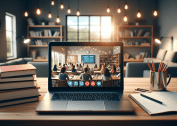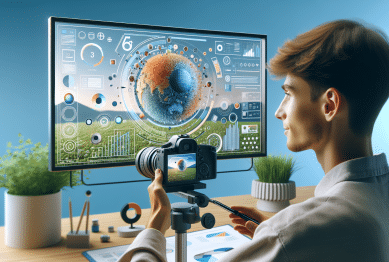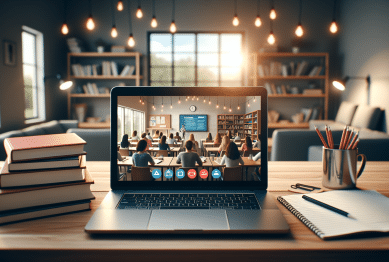Explore how digital literacy impacts learning, improves social opportunities, and shapes education today. Discover practical facts and research-backed insights on why digital skills matter for students and communities, and how you can make the most of technology’s role in your life.
Digital Literacy Opens New Doors in Education
Digital literacy is transforming how individuals interact with information, collaborate with others, and access opportunities for lifelong learning. Skills such as navigating online resources, critically evaluating digital content, and using collaborative online tools are not just desirable but essential. Many students are finding that a strong foundation in digital skills allows them to participate more actively in class, conduct independent research, and showcase their creativity in unique ways. For example, being able to distinguish between credible and misleading online information is now a crucial aspect of academic success—something educators are increasingly integrating into their teaching routines (Source: https://www.edutopia.org/digital-literacy-resources).
Beyond academics, digital literacy is a driver of equity. Not everyone begins with equal access to technology, but integrating digital literacy programs levels the playing field. As more schools provide devices and online connectivity, students from different backgrounds can connect with diverse voices, cultures, and ideas. This broad network supports improved digital inclusion and fosters social mobility, demonstrating that technology, when met with education, can be a great equalizer (Source: https://digitalpromise.org/wp-content/uploads/2016/09/literacybrief2_FIN.pdf).
The reach of digital skills stretches far beyond classroom walls. Persons with digital fluency report more confidence in adapting to changing job requirements and community challenges. Skills like coding, online collaboration, and digital storytelling allow learners to participate in global issues and communicate ideas that matter. As the digital world evolves, so do the advantages for those ready to grow with it.
Key Elements of Digital Literacy in Modern Society
Digital literacy encompasses much more than simply using a computer. It involves understanding what information to trust, how to engage safely online, and how to participate actively on digital platforms. This includes critical thinking about cyber threats, digital citizenship, and privacy, all fundamental to responsible participation in digital society (Source: https://www.commonsense.org/education/digital-citizenship). Critical assessment is vital with the proliferation of misinformation and digital manipulation. Students and professionals alike need to discern fact from fiction online to protect themselves and their communities.
The ability to produce content responsibly sets digitally literate individuals apart. This could mean creating videos for class projects, sharing insights through blogs, or collaborating on shared documents and presentations. Learning to express oneself digitally not only cultivates technical skills but also amplifies voices that might otherwise go unheard. By mastering communication on different digital platforms, users gain both empathy and influence.
Moreover, digital literacy is woven into every fabric of modern society—from navigating e-government services to participating in online civic activities. With an increasing number of social and economic functions shifting online, being digitally skilled is central to informed participation in local and global affairs. Digital literacy supports everything from advocacy efforts to expanding access to essential services (Source: https://www.unesco.org/en/education/digital-literacy).
Impact on Student Engagement and Achievement
Students equipped with digital literacy skills demonstrate greater classroom engagement. With the power to find and verify information themselves, learning becomes more autonomous. Interactive lessons using multimedia, apps, or gamified platforms foster curiosity and make education more relatable. Peer collaboration thrives when students can connect and problem-solve using digital spaces. This boosts participation and develops teamwork, a skill that extends beyond school.
Digital literacy encourages active learning. Rather than memorizing facts, learners are challenged to create, analyze, and synthesize new ideas using technology. For instance, students might use coding to model scientific concepts or social media to share community research. Such tasks require both digital and traditional literacy, merging technology with core academic competencies. Research shows that students who feel confident in digital skills are more likely to persist in challenging subjects (Source: https://www.brookings.edu/articles/digital-literacy-in-education/).
Digital learning environments often support personalization. Students can revisit lessons, engage in interactive tutorials, and access feedback anytime. This flexibility transforms traditional notions of attendance and participation and can meet the needs of diverse learners more effectively. Technology, when coupled with digital literacy, enables learners to set their own pace and path.
Digital Literacy and Social Opportunities
Possessing strong digital skills does more than boost academic performance; it expands social possibilities. Networking through educational and professional platforms can connect individuals with mentors, collaborators, and interest groups worldwide. Through digital literacy, users join vibrant online communities, fostering connections that would not be possible otherwise. Engagement in these spaces often sparks pride, confidence, and a sense of global citizenship.
Online collaboration is becoming an integral part of both learning and working today. The ability to use collaborative tools—such as shared documents, cloud-based apps, or group messaging—is highly valued in workplaces and university projects. Students familiar with these tools are well-prepared for future job markets and community organizing. Public outreach and activism are equally empowered by digital skills, allowing broader participation in social causes.
Social media literacy is a component often overlooked. Understanding platform algorithms, privacy settings, and the impact of digital footprints enables users to navigate these spaces safely. The knowledge to communicate respectfully and ethically online is fundamental to modern social success. Digital guidance from trusted sources, including parents and educators, remains essential for building these habits.
Barriers to Digital Literacy and Initiatives Creating Change
Despite its growing importance, digital literacy is not universally accessible. Barriers like lack of devices, unreliable internet, or insufficient support restrict opportunities in many communities. Marginalized groups, rural students, and those in under-resourced schools face the greatest digital divide. This divide widens educational gaps and limits the potential for equal achievement (Source: https://www.pewresearch.org/internet/2021/06/22/digital-divide-persists-even-as-americans-with-lower-incomes-make-gains-in-tech-adoption/).
Numerous organizations are working to bridge this gap. Schools have adopted blended learning models and offer technology loan programs; nonprofits support community training and device donation drives. Policymakers advocate for universal broadband and digital literacy standards as foundational to lifelong learning. Examples include public digital labs, community internet access initiatives, and national digital skills curricula.
Increasing awareness and support drives positive change. Promoting professional development for teachers, investing in infrastructure, and engaging families in digital education all contribute to narrowing the digital divide. When entire communities prioritize digital learning, the benefits echo for generations, creating new pathways to knowledge and empowerment for everyone involved.
Tips for Growing Digital Skills Independently
Not every path to digital literacy requires formal coursework. Plenty of trusted platforms and public resources support individuals seeking to boost their digital confidence on their own terms. Libraries often host free digital skill workshops or provide access to online learning modules. Massive open online courses (MOOCs) present structured lessons from basic computer navigation to advanced coding. These resources cater to all learning styles and experience levels (Source: https://www.mooc.org/blog/what-is-digital-literacy).
Hands-on practice builds digital skills organically. Exploring new tools, troubleshooting problems, and contributing to online forums enhance both knowledge and problem-solving abilities. Volunteering to set up school or community websites, joining group projects, or supporting others in digital tasks accelerates learning and boosts confidence. Learning by doing is a time-tested approach that adapts well to digital skills acquisition.
Never overlook safety and privacy. Confidence in navigating digital spaces grows when learners are informed about protecting personal information, avoiding scams, and using strong passwords. Reputable guides and support groups exist to help anyone become a safer, more savvy technology user. The investment in ongoing digital education pays off for a lifetime, supporting success across academic, professional, and personal pursuits.
References
1. Edutopia. (n.d.). Digital Literacy Resources for Teachers. Retrieved from https://www.edutopia.org/digital-literacy-resources
2. Digital Promise. (2016). Equity and Digital Literacy. Retrieved from https://digitalpromise.org/wp-content/uploads/2016/09/literacybrief2_FIN.pdf
3. Common Sense Education. (n.d.). Digital Citizenship. Retrieved from https://www.commonsense.org/education/digital-citizenship
4. UNESCO. (n.d.). Digital Literacy in Education. Retrieved from https://www.unesco.org/en/education/digital-literacy
5. Brookings Institution. (n.d.). Digital Literacy in Education. Retrieved from https://www.brookings.edu/articles/digital-literacy-in-education/
6. MOOC.org. (n.d.). What is Digital Literacy? Retrieved from https://www.mooc.org/blog/what-is-digital-literacy









